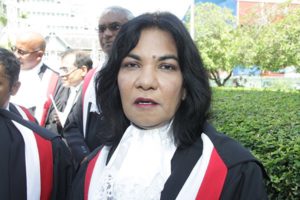-man had travelled via Guyana
A High Court judge has called on Parliament to revise immigration laws to more clearly define the powers of Immigration officials in handling illegal immigrants and refugees.
Justice Carol Gobin made the call last Friday as she ordered the immediate release of Nigerian Henry Ekwedike, who was unlawfully detained while applying for permanent residency through his Trinidadian wife after living in Trinidad for almost a decade.

Gobin said: “The challenges posed by increased illegal immigration, human trafficking and a phenomenon which we may well anticipate of growing numbers of refugee arrivals, make it imperative, in my humble view, that those who are charged with the power and responsibility to address defects in the legislation do so sooner rather than later.”
In her 19-page judgment delivered in the Port-of-Spain High Court during the Judiciary’s annual vacation, Gobin said the Immigration Division officers acted unlawfully when they issued Ekwedike rejection and supervision orders during a routine visit to their offices to follow up on his residency application on March 29.
Ekwedike was detained on April 12 as he returned to the office without a return ticket to Nigeria, as required under the orders, and because officials were suspicious of the fact that his wife had stopped attending the meetings with him since 2015.
Gobin ruled that the orders were illegal, as they were reserved for persons who are rejected admission into T&T on first entry and not those who were engaged in a residency application process.
“It would mean that such persons who are simply trying to observe our immigration laws and to comply with the directions of authorities would have to do so on pain of summary arrest and detention,” Gobin said.
“While such power may be obviously necessary for the effective discharge of their duties at ports of entry, it would hardly be reasonably required for processing extension applications for permitted entrants.”
As part of her ruling, Gobin ordered that the State pay Ekwedike’s legal costs for bringing the habeas corpus application to challenge his detention.
Ekwedike was represented by Fareed Scoon, Navindra Ramnanan, Wesley George, Ricky Pandohee and Nathifa Lowman.
According to the evidence in his case, Ekwedike entered T&T illegally through Moruga in early 2008 and married a Trinidadian woman in June that year. In 2009, he and his wife visited the Immigration Division’s offices to apply for residency for him through her nationality and were informed he had to leave Trinidad and re-enter through a legal port of entry to begin the process.
Ekwedike complied, went through Guyana and was granted entry at the Piarco International Airport. He submitted an application and was granted permission by the Ministry of National Security to stay and work in T&T without a work permit while it was being processed. In 2015, Ekwedike was ordered to pay a security bond as part of the process.
He sought and received several extensions and was seeking a fourth when he was issued the orders.
In their evidence in the case, immigration officers claimed they became suspicious of Ekwedike after they asked about his wife and he claimed that she had stopped attending as she had gotten a job on a cruise ship. Later checks revealed his wife had never been issued a passport.
In her judgment, Gobin did not analyse the status of Ekwedike’s marriage save and except to say that they no longer lived together but were still legally married. Since being detained, Ekwedike had been housed at the Immigration Detention Centre in Aripo. The facility has come under criticism recently over alleged over-crowding and inhumane conditions.



